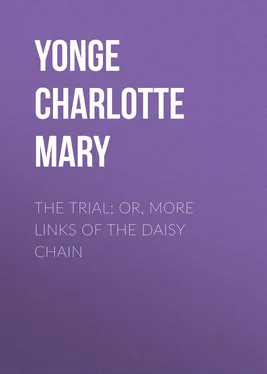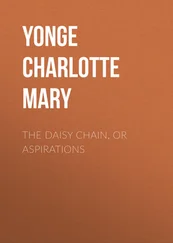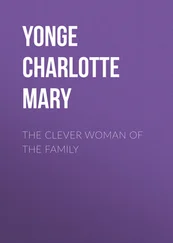Charlotte Yonge - The Trial; Or, More Links of the Daisy Chain
Здесь есть возможность читать онлайн «Charlotte Yonge - The Trial; Or, More Links of the Daisy Chain» — ознакомительный отрывок электронной книги совершенно бесплатно, а после прочтения отрывка купить полную версию. В некоторых случаях можно слушать аудио, скачать через торрент в формате fb2 и присутствует краткое содержание. Жанр: foreign_prose, literature_19, Европейская старинная литература, foreign_antique, на английском языке. Описание произведения, (предисловие) а так же отзывы посетителей доступны на портале библиотеки ЛибКат.
- Название:The Trial; Or, More Links of the Daisy Chain
- Автор:
- Жанр:
- Год:неизвестен
- ISBN:нет данных
- Рейтинг книги:4 / 5. Голосов: 1
-
Избранное:Добавить в избранное
- Отзывы:
-
Ваша оценка:
- 80
- 1
- 2
- 3
- 4
- 5
The Trial; Or, More Links of the Daisy Chain: краткое содержание, описание и аннотация
Предлагаем к чтению аннотацию, описание, краткое содержание или предисловие (зависит от того, что написал сам автор книги «The Trial; Or, More Links of the Daisy Chain»). Если вы не нашли необходимую информацию о книге — напишите в комментариях, мы постараемся отыскать её.
The Trial; Or, More Links of the Daisy Chain — читать онлайн ознакомительный отрывок
Ниже представлен текст книги, разбитый по страницам. Система сохранения места последней прочитанной страницы, позволяет с удобством читать онлайн бесплатно книгу «The Trial; Or, More Links of the Daisy Chain», без необходимости каждый раз заново искать на чём Вы остановились. Поставьте закладку, и сможете в любой момент перейти на страницу, на которой закончили чтение.
Интервал:
Закладка:
'He told me,' said Ethel, hurrying it out in a fright, 'that you went away—out of generosity—not to interfere with his happiness.'
Then she felt as if she had done a shocking thing, and waited anxiously, while Dr. Spencer deliberately made a deep hole in the shingle with his stick. 'Well,' at last he said, 'I thought that matter was unknown to all men—above all to Dick!'
'It was only after you were gone, that he put things together and made it out.'
'Did—she—know?' said Dr. Spencer, with a long breath.
'I cannot tell,' said Ethel.
'And how or why did he tell you?' (rather hurt.)
'It was when first you came. I am sure no one else knows it. But he told me because he could not help it; he was so sorry for you.'
They walked the whole length of the parade, and had turned before Dr. Spencer spoke again; and then he said, 'It is strange! My one vision was of walking on the sea-shore with her; and that just doing so with you should have brought up the whole as fresh as five-and-thirty years ago!'
'I wish I was more like her,' said Ethel.
No more was wanting to make him launch into the descriptions, dear to a daughter's heart, of her mother in her sweet serious bloom of young womanhood, giving new embellishments to the character already so closely enshrined in his hearer's heart, the more valuable that the stream of treasured recollection flowed on in partial oblivion of the person to whom it was addressed, or, at least, that she was the child of his rival; for, from the portrait of the quiet bright maiden, he passed to the sufferings that his own reserved nature had undergone from his friend's outspoken enthusiasm. The professor's visible preference for the youth of secure prospects, had not so much discouraged as stung him; and in a moment of irritation at the professor's treatment, and the exulting hopes of his unconscious friend, he had sworn to himself, that the first involuntary token of regard from the young lady towards one or the other, should decide him whether to win name and position for her sake, or to carry his slighted passion to the utmost parts of the earth, and never again see her face.
'Ethel,' he said, stopping short, 'never threaten Providence—above all, never keep the threat.'
Ethel scarcely durst speak, in her anxiety to know what cast the die, though with all Dr. Spencer's charms, she could not but pity the delusion that could have made him hope to be preferred to her father—above all, by her mother. Nor could she clearly understand from him what had dispelled his hopes. Something it was that took place at the picnic on Arthur's Seat, of which she had previously heard as a period of untold bliss. That something, still left in vague mystery, had sealed the fate of the two friends.
'And so,' said Dr. Spencer, 'I took the first foreign appointment that offered. And my poor father, who had spent his utmost on me, and had been disappointed in all his sons, was most of all disappointed in me. I held myself bound to abide by my rash vow; loathed tame English life without her, and I left him to neglect in his age.'
'You could not have known or expected!' exclaimed Ethel.
'What right had I to expect anything else? It was only myself that I thought of. I pacified him by talk of travelling, and extending my experience, and silenced my conscience by intending to return when ordinary life should have become tolerable to me—a time that never has come. At last, in the height of that pestilential season in India, came a letter, warning me that my brother's widow had got the mastery over my poor father, and was cruelly abusing it, so that only my return could deliver him. It was when hundreds were perishing, and I the only medical man near; when to have left my post would have been both disgraceful and murderous. Then I was laid low myself; and while I was conquering the effects of cholera, came tidings that made it nothing to me whether they or I conquered. This,' and he touched one of his white curling locks, 'was not done by mere bodily exertion or ailment.'
'You would have been too late any way,' said Ethel.
'No, not if I had gone immediately. I might have got him out of that woman's hands, and made his life happy for years. There was the sting, but the crime had been long before. You know the rest. I had no health to remain, no heart to come home; and then came vagrancy indeed. I drifted wherever restlessness or impulse took me, till all my working years were over, and till the day when the sight of your father's wedding-ring showed me that I should not break my mad word by accepting the only welcome that any creature gave me.'
'And, oh! surely you have been comforted by him?'
'Comforted! Cut to the heart would be truer. One moment, I could only look at him as having borne off my treasure to destroy it; but then there rose on me his loving, patient, heartbroken humility and cheerfulness; and I saw such a character, such a course, as showed me how much better he had deserved her, and filled me with shame at having ever less esteemed him. And through all, there was the same dear Dick May, that never, since the day we first met at the pump in the school court, had I been able to help loving with all my heart—the only being that was glad to see me again. When he begged me to stay and watch over your sister, what could I do but remain while she lived?'
'So he bound you down! Oh, you know how we thank you! no, you can't, nor what you have been to him, and to all of us, through the worst of our sad days. And though it was a sacrifice, I do not think it was bad for you.'
'No, Ethel. When you implored me to give up my Crimean notion, to spare your father pain, I did feel for once that you at least thought me of value to some one.'
'I cannot bear you to speak so,' cried Ethel. 'You to talk of having been of no use!'
'No honest man of principle and education can be utterly useless; but when, three days ago, I recollected that it was my sixtieth birthday, I looked back, and saw nothing but desultory broken efforts, and restless changes. Your father told me, when I thought him unaware of the meaning of his words, that if I had missed many joys, I had missed many sorrows; but I had taken the way to make my one sorrow a greater burden than his many.'
'But you do not grieve for my mother still?' said Ethel, anxiously. 'Even his grief is a grave joy to him now; and one is always told that such things, as it was with you, are but a very small part of a man's life.'
'I am not one of the five hundred men, whom any one of five hundred women might have equally pleased,' said Dr. Spencer; 'but it is so far true, that the positive pain and envy wore out, and would not have interfered with my after life, but for my own folly. No, Ethel; it was not the loss of her that embittered and threw away my existence; it was my own rash vow, and its headstrong fulfilment, which has left me no right to your father's peaceful spirit.'
'How little we guessed!' said Ethel. 'So cheerful and ready as you always are.'
'I never trouble others, he said abruptly. 'Neither man nor woman ever heard a word of all this; and you would not have heard it now, but for that sea; and you have got your mother's voice, and some of her ways, since you have grown older and more sedate.'
'Oh, I am so glad!' said Ethel, who had been led to view her likeness to her father as natural, that to her mother as acquired.
Those were the last words of the conversation; but Ethel, leaning from her window to listen to the plash of the waves, suspected that the slowly moving meteor she beheld, denoted that a cigar was soothing the emotions excited by their dialogue. She mused long over that revelation of the motives of the life that had always been noble and generous in the midst of much that was eccentric and wayward, and constantly the beat of the waves repeated to her the half-comprehended words, 'Never threaten Providence.'
Читать дальшеИнтервал:
Закладка:
Похожие книги на «The Trial; Or, More Links of the Daisy Chain»
Представляем Вашему вниманию похожие книги на «The Trial; Or, More Links of the Daisy Chain» списком для выбора. Мы отобрали схожую по названию и смыслу литературу в надежде предоставить читателям больше вариантов отыскать новые, интересные, ещё непрочитанные произведения.
Обсуждение, отзывы о книге «The Trial; Or, More Links of the Daisy Chain» и просто собственные мнения читателей. Оставьте ваши комментарии, напишите, что Вы думаете о произведении, его смысле или главных героях. Укажите что конкретно понравилось, а что нет, и почему Вы так считаете.












